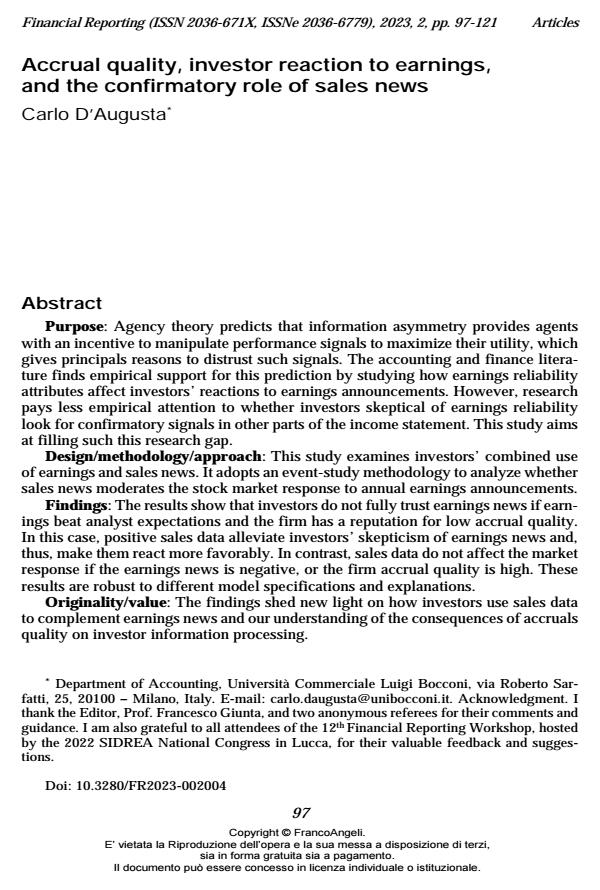Accrual quality, investor reaction to earnings, and the confirmatory role of sales news
Titolo Rivista FINANCIAL REPORTING
Autori/Curatori Carlo D’Augusta
Anno di pubblicazione 2023 Fascicolo 2023/2
Lingua Inglese Numero pagine 25 P. 97-121 Dimensione file 254 KB
DOI 10.3280/FR2023-002004
Il DOI è il codice a barre della proprietà intellettuale: per saperne di più
clicca qui
Qui sotto puoi vedere in anteprima la prima pagina di questo articolo.
Se questo articolo ti interessa, lo puoi acquistare (e scaricare in formato pdf) seguendo le facili indicazioni per acquistare il download credit. Acquista Download Credits per scaricare questo Articolo in formato PDF

FrancoAngeli è membro della Publishers International Linking Association, Inc (PILA), associazione indipendente e non profit per facilitare (attraverso i servizi tecnologici implementati da CrossRef.org) l’accesso degli studiosi ai contenuti digitali nelle pubblicazioni professionali e scientifiche.
Purpose: Agency theory predicts that information asymmetry provides agents with an incentive to manipulate performance signals to maximize their utility, which gives principals reasons to distrust such signals. The accounting and finance literature finds empirical support for this prediction by studying how earnings reliability attributes affect investors’ reactions to earnings an-nouncements. However, research pays less empirical attention to whether in-vestors skeptical of earnings reliability look for confirmatory signals in other parts of the income statement. This study aims at filling such this research gap. Design/methodology/approach: This study examines investors’ combined use of earnings and sales news. It adopts an event-study methodology to ana-lyze whether sales news moderates the stock market response to annual earn-ings announcements. Findings: The results show that investors do not fully trust earnings news if earnings beat analyst expectations and the firm has a reputation for low accru-al quality. In this case, positive sales data alleviate investors’ skepticism of earnings news and, thus, make them react more favorably. In contrast, sales data do not affect the market response if the earnings news is negative, or the firm accrual quality is high. These results are robust to different model speci-fications and explanations. Originality/value: The findings shed new light on how investors use sales data to complement earnings news and our understanding of the consequences of accruals quality on investor information processing.
Parole chiave:accrual quality, sales news, revenue reaction, earnings response
Jel codes:M41, G14
- Unintended consequences of tax incentives on the accounting quality of private firms Massimiliano Bonacchi, Luca Menicacci, in FINANCIAL REPORTING 2/2025 pp.91
DOI: 10.3280/fr202519445 - International Financial Reporting Standards and sales manipulation in failed firms Ekaete Efretuei, in FINANCIAL REPORTING 1/2025 pp.51
DOI: 10.3280/fr202516191
Carlo D’Augusta, Accrual quality, investor reaction to earnings, and the confirmatory role of sales news in "FINANCIAL REPORTING" 2/2023, pp 97-121, DOI: 10.3280/FR2023-002004